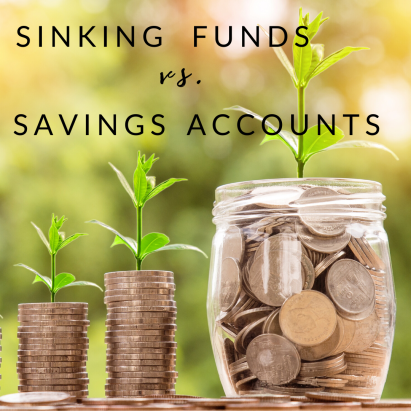When I was a kid, my parents always told me to save money, but there was never really a plan or a reason why. And at the time, I was working jobs where there wasn’t a lot of money leftover after I paid for expenses and a little fun. So it never really clicked. I would definitely save for stuff. I remember having envelopes in my dresser where I would stash money for a prom dress or for covering living expenses when I eventually moved out. But just having a savings account really wasn’t on my mind.
Now? A very different story. Not only do we have sinking funds for various expenses, but we also have a few different savings accounts. I’ve found that the key to saving money is knowing why you’re saving it, and that “why” could be anything from peace of mind to a specific goal.
First, let’s define what a savings account is and how it differs from a sinking fund.
A savings account is where you’re going to stash long-term money that you will use in the future, though not necessarily on a specific or known expense. A sinking fund is a short-term savings account intended for a very specific purpose.
Why do I need a savings account?
There are two main reasons to have a savings account: Opportunity and emergency.
Opportunity: Sometimes a deal comes up and you need some money on hand to take advantage of it. It could be a set of furniture your friend is finally selling. It could be a car that popped up on Marketplace. It could be a crazy sale on a jacket you’ve been eyeing. It could be an impromptu trip that your sister’s taking and asks you to join. Having money set aside for an opportunity gives you the freedom to take advantage of it without guilt or debt.
Emergency: While I recommend having a separate emergency fund of three to six months set aside, it doesn’t hurt to have a smaller, secondary emergency fund. This allows your main emergency fund to only be for big emergencies, like losing a job or an extended hospital stay where you wouldn’t be able to make your monthly expenses. But smaller emergencies happen as well. You might need a new water heater or to pay a large medical bill, and that’s where the secondary fund comes in handy.
Peace of mind: This is the main reason we keep some money in savings. Rather than be worried that an emergency would wipe us out or put us in debt or that we wouldn’t be able to replace a car or the furnace or that a great opportunity will come along that we can’t afford, we keep some money set aside in case of any or all of these scenarios. It helps me sleep better at night and make decisions without fear.
Where should I keep my savings account?
Banks offer savings accounts, but you likely won’t earn much interest when you keep the money there. The average annual interest rate for a savings account is just under 0.5%. Money market accounts through your bank typically offer higher interest rates – between 0.5% and 1% (ours is currently 0.805%). You can also look for other money market opportunities. For instance, we have one through Edward Jones that’s around 5%. High yield savings accounts (HYSAs) are another option and their rates are typically 5% or higher.
Wherever you choose to keep your money, make sure you can access it relatively quickly. Our Edward Jones money market takes between three and five days to transfer money into our checking account which is why we leave our emergency fund in that account. Our secondary savings stays in our bank’s money market account because that is accessible immediately.
How do I know if I have enough in savings?
How much you need to have in your savings is entirely dependent on your financial situation and comfort level, but here’s how I think of it for our family.
Emergency fund: We calculated three months of expenses in the event that one or both of us isn’t able to work, and we need to get through a few months without income.
I included:
- Mortgage
- Utilities
- Groceries
- Gas
I didn’t include:
- Charitable giving
- Investments
- Subscriptions
- Entertainment money
All of these things would stop if we were in a dire situation that required our emergency fund.
Savings account: We know that we’re going to need to replace our vehicle(s) in the near future, so I accounted for that. There’s also a cushion in case we need to do a larger home repair, like replace a water heater, fix the furnace, etc. I would also take major car repairs that don’t fit in the budget out of this account. For us, this account is right around $10,000. It’s enough to give us some freedom and flexibility without taking too much away from paying on our mortgage and getting the house paid off quickly.
What else do you need to know about savings accounts???

